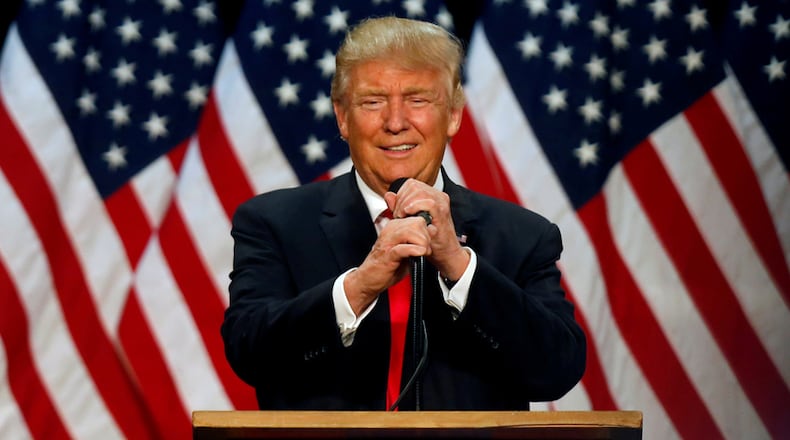WASHINGTON – Georgia's Republican lawmakers in Congress voted overwhelmingly in favor of Donald Trump's legislative initiatives during the president's first six months in office.
In fact, the state's 10 GOP representatives and two Republican senators have voted in lockstep with the president's positions an average of 98.8 percent of the time.
That's according to a database compiled by the political analysis blog FiveThirtyEight. The outlet cross-referenced how every member of Congress voted on more than three-dozen bills since January with President Trump's stated positions on the legislation. The results provide a fascinating ground-level look into how partisan politics continues to define the rhythms of Washington.
Here are some interesting Georgia tidbits:
- Seven of Georgia's 10 Republicans in the House voted with Trump 100 percent of the time
- The state's Democrats, meanwhile, only backed the president's initiatives an average of 15.4 percent of the time
- Atlanta Democrat John Lewis, who has gotten into a few very public tiffs with Trump over the past few months, was among the top 10 dissenting Democrats
- There wasn't a difference in voting behavior between the Georgia Republicans from districts that Trump won overwhelmingly and those he carried by less than 7 percentage points in November
Georgia's Republicans were united in backing most of Trump's initiatives, according to the data, but they were hardly alone.
Most Republicans in Congress voted with the president at least 90 percent of the time -- not uncommon in the modern political era when the same party is in power on Capitol Hill and in the White House. Even Susan Collins of Maine, a centrist who voted with Trump the least among Senate Republicans, took the president's position 86 percent of the time.
Conversations with top aides to Georgia GOP lawmakers over the last few months reflect a delegation that is eager to show off its support for Trump. Some are downright terrified of any suggestion they dither from the president, even among the Republicans who had previously voiced major differences on issues such as trade and the travel ban.
That's for strategic reasons, of course. Support for Trump, particularly among Georgia's more rural voters, is strong. And those very Trump voters often constitute those Republican lawmakers' own base, one they most certainly don't want to alienate.
Democrats, meanwhile, voted against the bills Trump supported the overwhelming majority of the time. Among Georgia's four Democrats, none voted with him more than 30 percent of the time, but there was a notable difference between the state's two more moderate Democrats versus the two more liberal lawmakers.
Another thing worth noting is that with the exception of health care in the House, neither chamber has voted on anything particularly divisive. House lawmakers spent the bulk of their first few months in the new Congress voting on bills that rolled back Barack Obama-era regulations -- hardly a contentious issue among Republicans -- while the Senate also focused on confirming Trump's Cabinet nominees. Far more interesting will be how GOP lawmakers grapple with fiscal issues in the upcoming months, including the debt ceiling and government spending bills.
About the Author
The Latest
Featured




